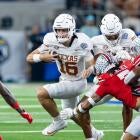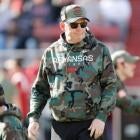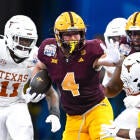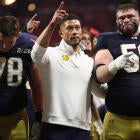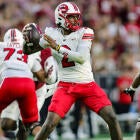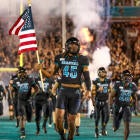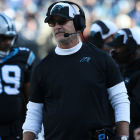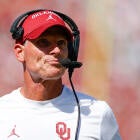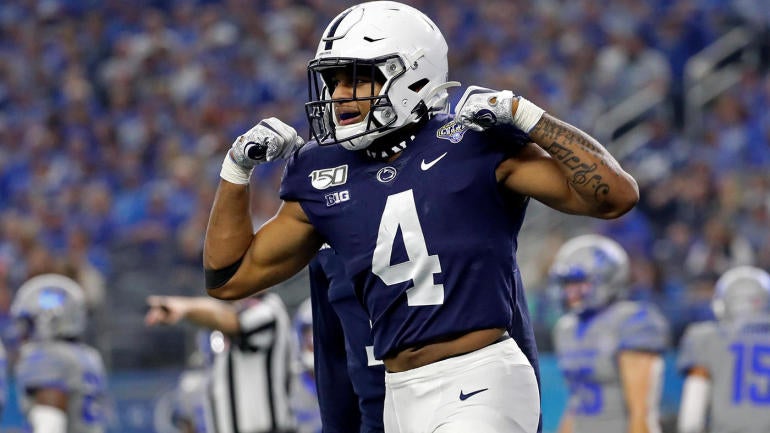
College athletes will be leading the revolution. That much is clear now that what is reported to be a total of 1,400 football players from the Pac-12 and Big Ten have issued separate manifestos demanding their rights be respected during the COVID-19 pandemic.
Big Ten players, under the banner "College Athlete Unity" released a list of demands Wednesday, three days after Pac-12 athletes (#WeAreUnited) released an even longer list.
The demands and threats may have been different, but be advised, this is a revolution.
The adults had their chance. It has not turned out well as they clumsily try to fit in a college football season amid a pandemic to gather revenue desperately need for their universities. There's only one problem for them: To get that money flowing in, they need their players perform.
Salaries have skyrocketed. Facilities have made the Taj Mahal blush. Meanwhile, the players already being asked to put their health on the line are now being told to do so in a different, even riskier way.
If it doesn't seem fair, that's because it's not. And it's why you cannot dismiss players from two major Power Five conferences standing up and calling out the stakeholders of a $4 billion industry just one month until the season begins.
Are there actually 1,400 of them (1,000 claimed by the Big Ten, 400 claimed by the Pac-12)? Maybe there are 900, 700 or 200. It doesn't really matter. They've hit a nerve with just a few hundred words.
Expect more players from more conferences making more statements.
The Pac-12 and Big Ten players have been talking for weeks, sources told CBS Sports. Ohio State quarterback Justin Fields hinted at something coming on a Tuesday conference call.
"I don't think this is the end of it," said Ramogi Huma, a college athlete activist who consulted with #WeAreUnited. "There's never been a more important time to address these issues."
If you have missed the message through this summer of player empowerment, it's this: The games can't go on without us.
This is their call. You may not like it, but times have changed. The players are acutely aware they control both the supply and demand of college football.
Taking a knee? How about taking charge of a sport that has exploited its players for far too long? With athletes formally organizing, history is being witnessed in real time. They have finally realized, en masse, that they are the product.
Sure, athletes have never had it better in terms of facilities, nutrition, tutors and cost of attendance. But should they settle for that, especially when it comes to their health and welfare?
No one accounted for a pandemic and the death of George Floyd. The dual tragedies, both still without resolution, awakened something all across a sport that is 45% Black.
"It was like the imperfect storm as far as starting a movement," said Chris Hinton, a former NFL player whose son plays for Michigan.
The Big Ten and Pac-12 players are united on one main topic the adults have overlooked: They want third-party oversight of all COVID-19 testing. There should be "sufficient penalties" for non-compliance.
"Mandates that aren't enforced become guidelines," Hinton said.
And guidelines are nothing more suggestions dressed up in formalwear. Third-party language should have been boilerplate for the conferences. Anything else is a conflict of interest.
Schools want to win. It's written in the budgets that are 80% fueled by football in the FBS. Sometimes, it can be a fine balance between that and prioritizing the health and safety of the labor force.
But that's why commissioners make millions of dollars. That's why athletic directors make high six figures. They can't screw this up. This is their moment, too. If they fail, the result will be more than red ink on a balance sheet.
The athletes' voices will no longer be muffled. They are united. As one, they are aware.
During this period of quarantine and social distancing, they've had plenty of time on their hands. They've had technology, too. That's something Huma never had when he played linebacker for UCLA in the late 1990s.
"It makes me feel hopeful," he said. "Back then, there was virtually no way to get in contact with players from other schools."
Yeah, the players want to play. We know that. But they also want to know they and their families are going to be safe.
Several players -- including projected first-round picks -- have already opted out this season, mostly to get a head start on the 2021 NFL Draft. Sooner or later, all players and their families will do their own risk assessment.
Is it worth it?
Without that assurance, without their input and consent, the games will not go on. They want you to know that, too.
"The players have always had the power. It's just never been channeled in this way," Huma said.
During this journey, it's OK if the players don't get it exactly right. The Pac-12 players asked for 50% of the conference's revenue, use of endowment funds to protect college sports and a reduction of commissioner Larry Scott's salary -- requests that are not exactly realistic.
That shouldn't detract from the message. This revolution is becoming a fascinating journey overseen by 18- to 22-year-olds.
"This thing may look different from one place to the next," Huma said. "Hopefully, the messaging doesn't get lost."
Don't blink. History is being written by the minute. You can't point to a central source for the dissatisfaction because it is so widespread.
Colorado State coaches are under investigation for allegedly forcing players to hide COVID-19 positives. (Some Rams players immediately went to Twitter on Tuesday to defend Coach Steve Addazio.) The university is now investigating the allegations.
On the bright side, the NCAA Board of Governors actually adopted two of the #WeAreUnited demands. The association did away with schools requiring players to sign waivers acknowledging their COVID-19 risk. Also, any COVID-19-related medical expenses incurred by players will come out of the pockets of the schools.
South Carolina coach Will Muschamp reportedly said Wednesday the SEC is going three weekly tests -- Monday, Wednesday and Friday. That is unconfirmed at this time. The Big Ten has decided to test twice each week. This after the NCAA released mandatory minimum guidelines that only call for one coronavirus test within 72 hours before kickoff.
Hinton praised the NCAA for a weekly conference call with his College Football Parents 247 group to discuss COVID-19 testing. A summit on the issue may take place Aug. 10.
Yes, the adults in college athletics have been minimized in these dizzying five months since COVID-19 began devastating the United States. Whatever college sports looks like post-pandemic, the athletes will have a heavy hand in shaping it.
There's been a lot of kicking the can down the road. The Power Five conferences all went through convoluted scheduling processes only to basically end up in the same place. The NCAA Board of Governors basically left it up to the individual divisions to stage their fall championships.
There is the gnawing feeling no one is leading. There is a hope the season will be played.
Pardon the players, but they need more than hope.
As flawed and youthful and loud as it may be, they have a mission. And whatever ultimately happens, it's going to be on their terms.
![[object Object] Logo](https://sportshub.cbsistatic.com/i/2020/04/22/e9ceb731-8b3f-4c60-98fe-090ab66a2997/screen-shot-2020-04-22-at-11-04-56-am.png)








